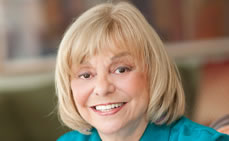Women Shaping History 2013
Dr. Judith Hochman: Author, Educator, Lecturer
 |
Photo credit: Ron Hester
|
What has inspired your current career path?
My son had learning disabilities and, at the time, no one knew how to effectively remediate or even diagnose them. I had been a mainstream classroom teacher but decided to go to graduate school in an attempt to master my own anxiety by finding out more about his difficulties. I enrolled in Teachers College in the 1980’s and I was fortunate to have, as my first two professors, Dr. Larry Silver, child psychiatrist, and Dr. Martha Denckla, pediatric neurologist. Those classes changed the course of my professional life because I became fascinated with how children learn. After that, most of my education came from a brilliant fellow graduate student, Margaret Stanback. She became my mentor and ally for educational reform.
What are some of the greatest challenges you’ve faced?
Many schools of education, even the so-called “leaders” in teacher education, continue to promote methods that are effective for only a small percentage of children. We have been too easily seduced by the newest fads instead of making informed decisions about instruction. My greatest challenge is to find effective ways to help teachers implement evidence-based, basic skill instruction into their classrooms.
In 1987, a small group of educators redefined the mission and curriculum of an independent school in White Plains: Windward. We implemented a curriculum grounded in evidence-based methods because we believed that direct instruction would help students with language and learning disabilities.
We knew that most children don’t “discover” how to read by putting a lot of books in the classroom or by guessing at words from their shapes or the picture on the page. They need direct instruction and specific strategies to learn to decode words. They have to understand sound-symbol associations and the syllable structure of English in order to become accurate and fluent decoders. Additionally, we knew that children don’t figure out how to write well by vague assignments in journals. They need explicit instruction about how to generate complex sentences, cohesive, coherent, unified paragraphs and compositions. They need systematic, sequential guidance about how to write a research paper and how to revise their work. Instead, too often, they are given assignments that result in disjointed thoughts about their own experiences. Students need to be guided to write in order to communicate, to explain and to inform.
I was Head of Windward for 11 years and, during that time, the Windward Teacher Training Institute (WTTI) was established. Its mission is to introduce teachers and other professionals to the research-supported methods we know will help all students. At Windward, we were able to demonstrate that applying research-based instruction in the classroom is not a reversion to the “drill and kill” methods of yesteryear. Students can be engaged and enjoy lessons and meaningful activities and, at the same time, master the skills they need to have in order to move forward.
What are some of the accomplishments you are most proud of?
It is fantastic to see the joy and pride of students who are achieving, and teachers who are successful. Perhaps the most consistently moving and inspiring experiences I have are when I observe the changes in the attitudes, thinking and knowledge of students and their teachers.
Who have been the most influential mentors in your life?
In addition to Margaret Stanback, my colleagues and students have been both inspiring and influential. I have gained so much from observing and teaching countless children over many years and learning from them. Throughout my career, I have been privileged to mentor a great number of talented and dedicated teachers and they have taught me as much, if not more, than I have taught them.
What would you describe as a turning point in your life?
My turning point came when I recognized that my son was not the only child whose needs were misunderstood and unmet in school. There are still too many children who are experiencing needless frustration, shame, anxiety and failure in classrooms.
What are your goals for the future?
I want to continue to: speak out about how we should be teaching all of our students instead of relying on approaches that are failing too many of them; provide staff development to teachers and administrators about how to understand and use the links between writing, reading comprehension and thinking; train school leaders in how implement the most effective curricula in their schools; advocate that elementary school leaders move away from programs that have failed for so many years to prepare their students for middle and high school. Teachers of older students have to spend far too much time teaching fundamental skills that should have been mastered earlier; and mentor and empower teachers and administrators who have the talent, intellect and energy to accomplish the goals above. #
